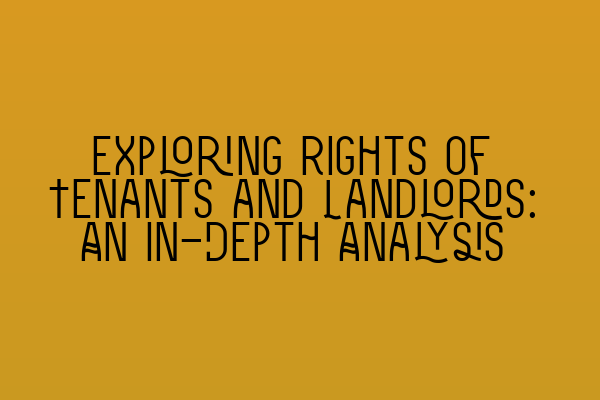Exploring Rights of Tenants and Landlords: An In-Depth Analysis
At SQE Property Law & Land Law, we understand the importance of a strong legal foundation when it comes to tenancy agreements and landlord-tenant relationships. In this blog post, we will delve into the intricacies of rights for both tenants and landlords, examining the key aspects of their legal positions. Whether you are a tenant seeking to understand your rights or a landlord looking to navigate the complexities of property law, this comprehensive analysis aims to provide clarity and guidance.
Tenants’ Rights
Tenants have a set of rights that protect them throughout their tenancy agreement. These rights are designed to ensure safety, security, and fair treatment, and are essential to maintaining a balanced relationship between tenants and landlords.
1. Right to Habitability and Safety
Tenants have the right to live in a habitable and safe property. This means that landlords are responsible for maintaining and repairing the property to ensure it remains in good condition. Issues such as structural deficiencies, dampness, pests, and faulty wiring are the responsibility of the landlord to fix. If these issues persist and the landlord fails to address them, tenants have the right to pursue legal action or seek remedies such as reduced rent or termination of the tenancy agreement.
To learn more about the contractual rights and limitations of such agreements, visit our article: Understanding Contractual Capacity: Rights and Limitations.
2. Right to Quiet Enjoyment
One of the fundamental rights of tenants is the right to quiet enjoyment of the property. This means that tenants have the right to live in the property without unnecessary disturbances or interference from the landlord. Landlords must respect this right and not intrude upon the tenant’s privacy, unless there is a valid reason such as conducting repairs or inspections. If landlords repeatedly violate this right, tenants can take legal action to seek compensation.
If you want to test your knowledge of contract law, including contractual capacity and other related topics, try our interactive SQE mock tests: Test Your Knowledge.
3. Right to Reasonable Notice for Access
Landlords may need to access the property for various reasons, such as repairs, inspections, or showing the property to potential new tenants. However, they must give reasonable notice to the tenant before entering the property. The specific notice period may vary depending on local regulations or the terms outlined in the tenancy agreement. Violating this right can result in legal consequences for landlords.
If you’re interested in gaining expert insights and guidance on SQE contract law topics, don’t miss our SQE Contract Law webinars: Expert Insights and Guidance.
Landlords’ Rights
While tenants have certain rights, it is important to acknowledge that landlords also have rights that protect their interests. Understanding these rights can help landlords navigate the rental process effectively and maintain a sustainable tenancy agreement.
1. Right to Collect Rent
Landlords have the right to receive timely payment of rent from their tenants. The terms and conditions for rent payment should be clearly outlined in the tenancy agreement, including the due date, accepted payment methods, and consequences for late payments. If tenants fail to pay rent as agreed, landlords may take legal action to recover the outstanding amount or terminate the tenancy agreement.
2. Right to Ensure Property Damage is Repaired
If tenants cause damage to the property beyond ordinary wear and tear, landlords have the right to request repairs or deduct the cost of repairs from the security deposit. It is crucial for landlords to document the condition of the property before and after each tenancy to provide evidence in case disputes arise.
To fully understand the concept of contractual capacity in contracting parties, we recommend reading our article: Contractual Capacity: Understanding Legal Competence in Contracting Parties.
3. Right to Terminate the Tenancy
Landlords have the right to terminate a tenancy agreement under certain circumstances, such as non-payment of rent, breach of the tenancy agreement, or if they wish to live in the property themselves. However, landlords must follow the proper legal procedures, including providing proper notice and adhering to local eviction laws, to avoid any legal consequences.
For a deeper analysis of recent changes in contract law that may impact landlords, take a look at our article: Contract Law Reforms: An Analysis of Recent Changes.
Conclusion
Understanding the rights of both tenants and landlords is fundamental to maintaining a harmonious and fair rental relationship. By familiarizing yourself with these rights, you can navigate the complexities of property law with confidence. If you have any further questions or require legal assistance regarding property law or landlord-tenant issues, please reach out to SQE Property Law & Land Law, where our team of experts is ready to provide you with the necessary guidance.
